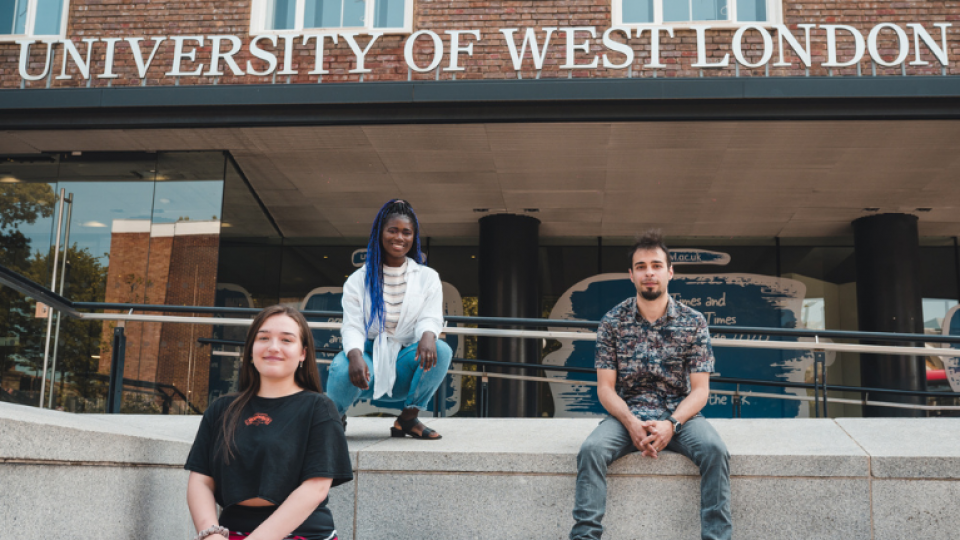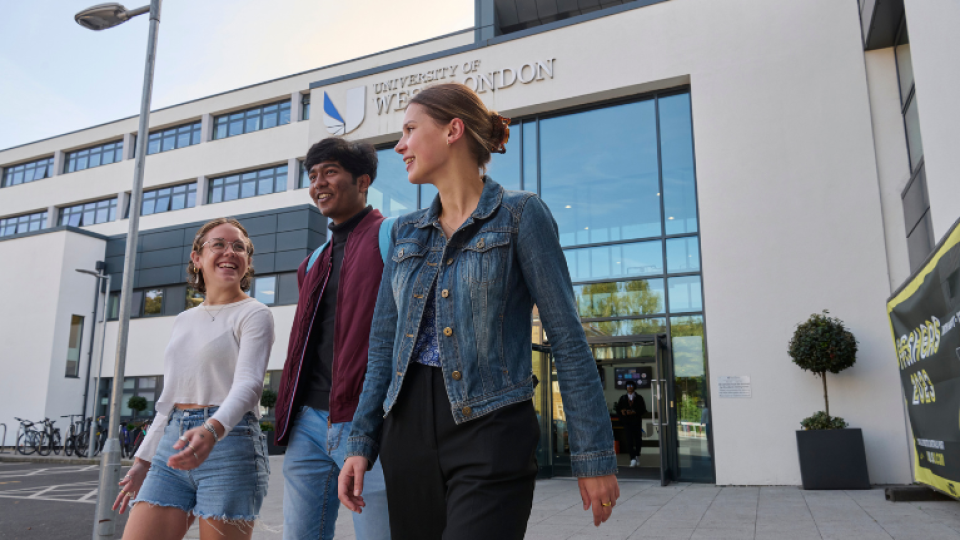
Impact 2028 Strategic Plan
Impact 2028 - our strategic plan intro
The University of West London is moving into a bold and exciting future guided by an ambitious strategic plan; Impact 2028.
The aspirations laid out in this plan are within our reach, fuelled by our standing as the nation’s
fastest-rising university and our commitment to student success and research productivity.
This plan charts our course for the next five years and positions UWL as a powerful engine of prosperity, one that prioritises: lifelong learning, impactful research, access, inclusion, sustainability, and
the ever-important digital ecosystem.
In recent years we have gained national recognition for the quality of the student experience and the social mobility that accrues from it. We have also gained a reputation for research productivity and innovation and as a result, we have become a destination of choice for a diverse body of students and staff.
In recent years we have gained national recognition for the quality of the student experience and the social mobility that accrues from it."
Download Impact 2028 Strategic Plan
Context and place
Great cities nurture great universities and vice versa. The University of West London sits at the heart of its region which continues to be a growing metropolis and economic powerhouse. The West London area has a combined value of more than £75 billion and is home to world renowned companies including Heathrow Airport, Glaxo Smith Kline, Cisco Systems, Disney, and Coca-Cola, with over 100,000 businesses housed in the region. It also has the largest proportion of start-up and micro companies in the capital.
As part of this dynamic eco-system, we will ensure that our many stakeholders in the region will be involved in helping us deliver high-quality outcomes for students while bringing added value to the economy. It will mean building on the talent and skills of everyone in the region by addressing technological change, automation, and business innovation. It will also mean up-skilling and re-skilling by ensuring learners of all ages and backgrounds receive the educational opportunities they deserve.
The University has approximately 16,000 academically and professionally accomplished students pursuing undergraduate, graduate, specialist, and professional degrees as far afield as Dubai, Sri Lanka, India, Singapore, China, Oman, Hong Kong, Berlin, Cyprus, Athens, and Spain.
The University of West London Group has a number of sites: the main campus at St Mary’s Road, Ealing, Cavendish and Century House on the Uxbridge Road, and the Drama Studio London. The Paragon House campus is located in Brentford while the Berkshire Institute of Health is housed in the centre of Reading. Ruskin College in Oxford is also part of the UWL Group.
Sector challenges
Since the adoption of the last strategic plan, Achievement 2023, the external operating environment has changed unexpectedly and dramatically: The COVID-19 pandemic; a war in Europe; a conflict in the Middle East; a period of significant and continuing inflation; and the freezing of the home undergraduate fee. These have created significant sector wide volatility and uncertainty.
-
Policy
Reforms following the post-Augar consultation are still in the pipeline and the future funding picture is undecided for research, undergraduate, postgraduate and overseas students.
-
Regulatory
The Office for Students and its focus on quality and standards, means the requirements for student outcomes (The B3 Conditions of Registration), the new Teaching Excellence Framework, and the new National Student Survey continue to be highly regulated.
-
Student experience
Students have experienced enormous disruption to their learning, in part because of the pandemic. This affected their wellbeing and mental health.
-
Financial
Higher education institutions face long-term, systemic pressures on their financial sustainability and viability.
-
Digital opportunities
The shift to digital and the impact of generative Artificial Intelligence (AI) such as ChatGPT are challenging the very nature of what we know and how we learn.
-
Pedagogic challenges
The new model of education delivery now involves a blended online and in-person experience, the balance of which remains contestable.
-
Climate change and sustainability
Reducing emissions and de-carbonising are driving the need for environmentally friendly estates and improved campus efficiency.
Our mission, values and promises
Our mission
Our mission is to nurture talent in all its forms, regardless of social background, gender, sexual orientation, and ethnicity; and empower our graduates to be confident, healthy, leading career professionals.
Our vision is to be a model institution in the preparation of graduates who are economically, socially, and ecologically impactful. A university that challenges, inspires, transforms, and achieves.
Our values
- Excellence: we commit to excel in all that we do.
- Innovation: we commit to be creative, responsive, and progressive.
- Integrity: we commit to be honest, ethical, authentic, and accessible.
- Inclusivity: we commit to respect and embrace equality and inclusion.
- Social responsibility: we commit to act for the public good.
- Courage: we commit to take the risks necessary to achieve our goals.
Our promises
- We will help all our students and staff to discover their purpose and translate that into a fulfilling career and a meaningful life.
- We will actively seek creative ideas, perspectives, and voices.
- We will provide support for everyone’s physical, mental, and emotional health.
- We will provide opportunities for meaningful engagement with partners beyond the University.
- We will ensure a vibrant University community for all students, academics and professional
support staff.
Strategic direction
As a diverse community defined by a rich palette of cultures, the new Strategic Plan addresses many of these challenges over the next five years. It will mean being balanced and visionary in our integration of the creative and performing arts and the human and social sciences alongside the biosciences, engineering, technology, AI and other STEM areas. We will also continue to excel in providing an affordable, accessible, and high-quality education. This will involve the promotion of lifelong learning and the creation, dissemination, and application of knowledge. We will build upon the ‘signs of the times’ and the ever-evolving needs of our students to re-animate our identity and secure our unwavering commitment to student access and success.
To achieve further impact, we will offer an exemplary education through research informed teaching, and a more digitally enhanced curriculum to provide greater employment led opportunities. We will also offer a renewed portfolio and a curriculum that will educate students to develop the insights they need to navigate and lead in a rapidly changing world. This will involve offering shorter, connected courses and micro-credentials alongside standard degrees underpinned by new digital technologies and Artificial Intelligence (AI). This ‘borderless education’ will accelerate the use of new pedagogic approaches and less static forms of learning. In addition, we will recruit, retain, and inspire academically and professionally able people who can continue to shape our human capital - our most precious resource.
Strategic outcomes, goals and our pillars
Strategic outcomes
- To be in the top 50 in the UK.
- To be in the top 70 research universities in the UK.
- To have a c. 700 World Ranking.
- To have Gold for sustainability and climate action.
- To achieve TEF Gold.
- To open a new Digital Futures Lab.
- To open the new School of Medicine and Biosciences.
Our pillars
The ’Strategic Pillars' underpinning this plan represent our distinctive areas of academic and interdisciplinary excellence. These ‘Pillars’ signify converging themes in teaching, research, and innovation across all our sites and campuses.
They are:
- Health
- Technology
- Sustainability
- Creativity
- Enterprise
Strategic goals
-
Promoting student success and life long learning
- Increase student recruitment and enrolment in key areas.
- Maintain the National Student Survey (NSS) at above 80%.
- Reduce the student-to-staff ratio (SSR).
- Triple the number of National Teaching Awards.
- Improve continuation and completion to benchmark.
- Enhance degree classifications in all areas.
-
Building scalable, impactful research
- Increase expenditure on research and scholarship by 10% annually
- Grow the number of research students to a c. 1000.
- Increase the number of academic staff with doctorates to 80%
- Put in place a Research Support Unit (RSU).
- Grow the number of academic staff engaged in research, advanced professional study, and scholarly activity by 50%.
- Improve the bibliometric and citation levels of all publications.
- Multiply the number of external funding bids and have a 1:6 success rate.
- Hit the top 70 by GPA in REF 2028 and have a world ranking of c700.
-
Re-balancing the curriculum from SHAPE to STEM
- Improve under-representation in all STEM areas.
- Integrate STEM subjects across the curriculum.
- Support innovative STEM pedagogies, inquiry-based learning and student research.
- Further expand external funding for STEM initiatives by 50%.
- Establish a research commercialisation and intellectual property framework.
- Foster innovation in STEM for community engagement.
- Open a new School of Medicine and Biosciences.
-
Embedding sustainability throughout the curriculum
- Continually improve environmental and energy management systems.
- Reduce carbon emissions and energy consumption.
- Enhance biodiversity across campuses and sites.
- Develop and promote sustainable travel.
- Embed sustainability in all capital projects.
- Communicate our sustainability strategy and aspirations to all our partners.
- Support the University’s employability and career-focused objectives.
Enabling strategies
-
Deploying and integrating AI and other digital technologies
- Offer students the opportunity to gain skills using AI supportive technologies.
- Shape and lead the public debate around digital futures.
- Encourage the use of AI to collect and manage resources.
- Learn about ethical and plagiarism issues linked to AI machines.
- Grow research capability and capacity in the areas of AI in Health, Data Science and Bioinformatics, Gamification and Digital Society.
-
Developing enterprise activities and innovative entrepreneurs
- Strengthen and grow new and existing enterprise collaborations – nationally and globally.
- Build a culture of entrepreneurship across the University.
- Increase the volume of start-up companies by 50%.
- Increase the number of patents awarded by 30%.
- Expand national and sub-contracted agreements.
- Maintain regulatory compliance in all collaborations and partnerships.
-
Generating local, national and global partnerships
- Be a ‘place-making’ institution in Feltham and support the establishment of a University Hub.
- Grow partnerships with local and regional school systems.
- Expand global partnerships and create operating ‘arms’ in Europe.
- Integrate partnerships in Hong Kong.
- Grow the Marbella International University Centre by 10% per annum.
- Open an International Maritime Institute.
- Grow UWL’s Ras Al-Khaimah campus by 30% by 2028.
-
Creating a high performing staff culture
- Ensure all reward process are flexible, fair, equitable and performance based.
- Build on existing systems for career progression, promotion and role enhancement.
- Guarantee that the Continuous Professional Development Framework is embedded and used effectively.
- Create a ‘pipe-line’ of talent across the institution.
- Provide appropriate levels of digital literacy, AI and sustainability awareness of staff in relation to their roles and functions.
-
Maintaining a strong, sustainable, financial base
- Design and implement transparent, and predictable budget setting models.
- Diversify revenue streams to support all operations.
- Grow alumni donations.
- Enhance strategic revenue alignment.
- Optimise investments and maximise institutional assets.
- Maintain rigorous cost control and streamline finance processes.
- Increase the effectiveness of digitalisation of the University’s operations.
-
Encouraging Internationalisation
- Grow our overseas student community and enhance the international student experience.
- Offer further opportunities for all our students to be globally engaged.
- Improve the internationalisation of the curriculum.
- Afford high quality international opportunities for our staff and students.
- Create and build a targeted international profile to enhance quality growth in the overseas market.
- Build international research, scholarship and knowledge exchange with our overseas partners.
- Engage international alumni to encourage new ideas and create opportunities.
-
Embed an inclusive and diverse culture across the University
- Continue to attract a diverse workforce and recruit students from all backgrounds.
- Develop a culture that promotes and celebrates equality, diversity and inclusion (EDI).
- Monitor and evaluate our EDI priorities and plans.
- Close all the attainment gaps in terms of awards, outcomes and progression.
- Ensure the objectives in our Access and Participation Plan (APP) are met.
- Use all equalities data to inform progress against our strategic outcomes.
Impact 2023-28 key performance indicators
-
Strategic goal: Promoting student success and lifelong learning
Target by 2028 and key performance indicators:
- 80%+ - National Student Survey (NSS).
- Gold - Teaching Excellence Framework (TEF).
- To Benchmark - continuation and completion.
-
Strategic goal: Building scalable impactful research
Target by 2028 and key performance indicators:
- Top 70 - Research Excellence Framework (REF).
- 80% - staff with doctorates.
- 1,000 - research students.
-
Strategic goal: Rebalancing the Curriculum from SHAPE to STEM
Target by 2028 and key performance indicators:
- UG and PG - School of Medicine.
- Up 30% - new STEM students.
-
Strategic goal: Embedding sustainability throughout the curriculum
Target by 2028 and key performance indicators:
- 50% - carbon reduction.
- Top 10 - People and Planet.
-
Enabling strategies: Maintaining a strong sustainable financial base
Target by 2028 and key performance indicators:
- 10%pa - surplus.
- c. 40% - staff costs.
-
Enabling strategies: Generating local, national and global partnerships
Target by 2028 and key performance indicators:
- 5,000 - overseas students.
- 8,000 - TNE numbers.
-
Enabling strategies: Developing enterprise activities and innovative entrepreneurs
Target by 2028 and key performance indicators:
- 50% growth - start up companies.
-
Enabling strategies: Deploying and integrating AI and other digital technologies
Target by 2028 and key performance indicators:
- Opened - Digital Futures Lab.










